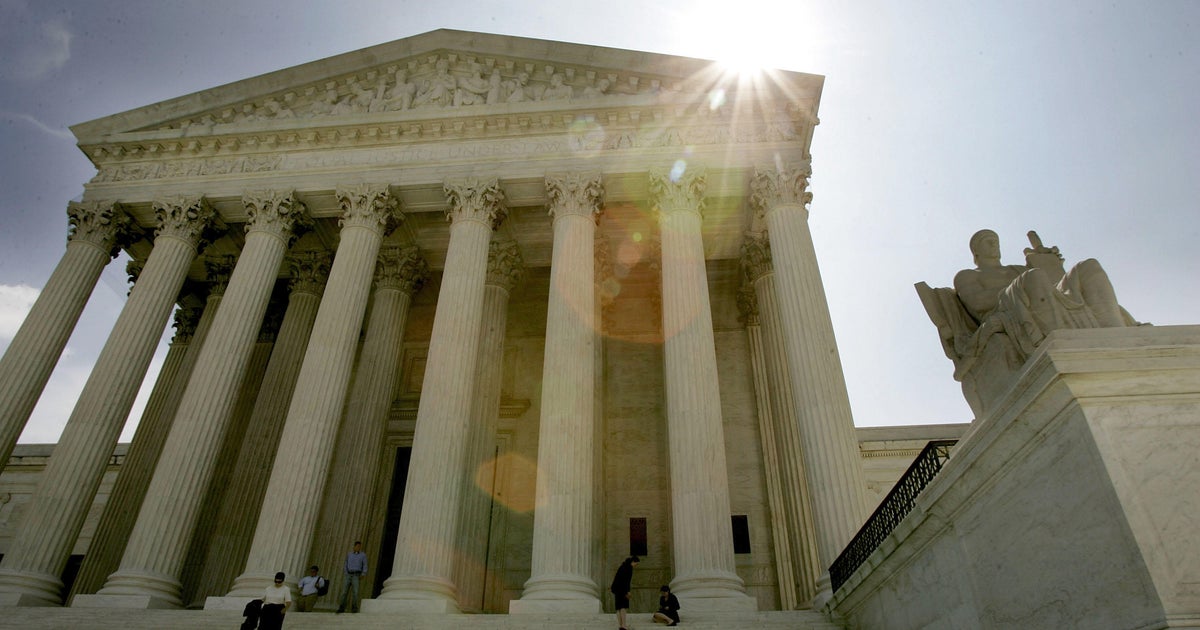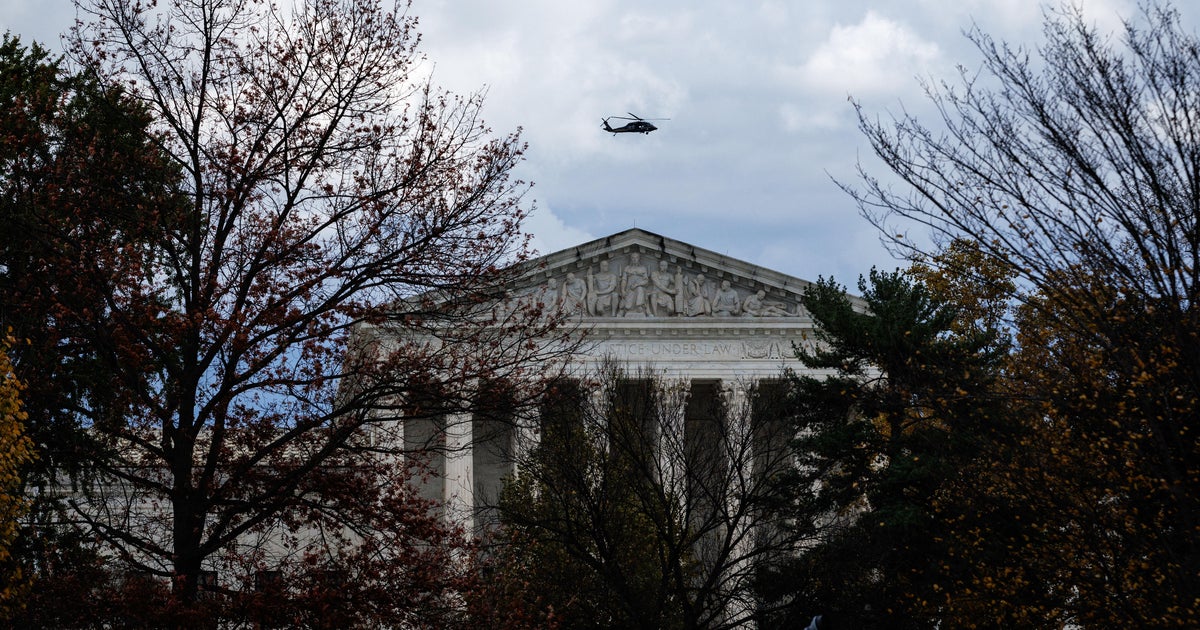Justice Department faces familiar hurdles in battle against Texas abortion law
Washington — The Justice Department's decision to sue the state of Texas over its law banning abortions after six weeks of pregnancy elevated the fight over abortion rights, but the department's legal challenge will not be free of hurdles, including some that tripped up abortion providers in their quest to stop it from taking effect.
"They are trying to take this argument and pull it up to the 30,000-foot level and really address how this law in Texas challenges fundamentally what they described as the national compact," Yvonne Lindgren, a law professor at the University of Missouri, Kansas City, told CBS News.
The Justice Department filed its challenge to the Texas abortion law this month and asked a federal judge last week to temporarily halt enforcement of the measure, arguing it is necessary not only to protect the constitutional rights of women, but also to "protect federal agencies, employees, and contractors whose lawful actions S.B. 8 purports to prohibit."
Judge Robert Pitman, appointed by former President Barack Obama, has not yet ruled on the Biden administration's request for an emergency order, but a hearing is scheduled for October 1.
The decision by the Justice Department to sue Texas over its six-week abortion ban marked an escalation in the federal government's efforts to protect abortion rights.
"Having skin in the game, spending money to go to court to challenge a law in this context, where states have not really been interfered with by the federal government, is a big deal," Mary Ziegler, a law professor at Florida State University, told CBS News.
Ziegler said the suit represents a change in "tone and priority," as the Biden administration is signaling it's going to explore all of its options to fight the law, even those that are "risky and unconventional."
But the Justice Department's case isn't clear cut, in part for the same procedural reasons that plagued abortion providers looking to challenge the law: It's still unclear exactly who the Biden administration should sue.
Unlike other abortion restrictions passed by states, which have been blocked by federal judges before taking effect, the Texas measure leaves enforcement to private citizens who can sue in state court purported violators, including anyone who helps a woman obtain an abortion after six weeks of pregnancy.
A person who successfully brings a suit is entitled to at least $10,000 from the violator.
"If people aren't enforcing the law, then who is the right defendant?" Ziegler said. "And they're not enforcing the law, because at the moment, no one has brought lawsuits because providers are saying they're complying."
In the immediate days after the Texas ban took effect, abortion clinics operating in the state said they were following the law, providing abortions to women only if there was no cardiac activity detected in a sonogram. But a Texas physician, Alan Braid, admitted in an op-ed published Saturday in The Washington Post that he provided an abortion to a woman outside the state's new limit on September 6, days after the law took effect.
"I fully understand that there could be legal consequences — but I wanted to make sure that Texas didn't get away with its bid to prevent this blatantly unconstitutional law from being tested," he wrote.
On Monday, a man in Arkansas filed suit against Braid in Texas state court, in what is believed to be the first case brought under the new law. Oscar Stilley, who describes himself as a "disbarred and disgraced former Arkansas lawyer" in his petition, told The Washington Post that he filed the suit to test the law's legality.
"If the law is no good, why should we have to go through a long, drawn-out process to find out if it's garbage?" he said.
In its lawsuit, the Justice Department named the state of Texas as the defendant. But it asked the court to block the state, as well as its "officers, employees, and agents, including private parties who would bring suit under the law," from enforcing the abortion measure.
The department argues that the U.S. has the "authority and responsibility to ensure that Texas does not evade its obligations under the Constitution and deprive individuals of their constitutional rights," and said the measure "unconstitutionally restricts" the operations of federal agencies including the Department of Labor, Office of Refugee Resettlement, Bureau of Prisons and Defense Department.
The law, prosecutors argued, "exposes federal personnel and grantees to liability for carrying out their federal obligations to provide access to abortion-related services to persons in the care and custody of federal agencies."
For the Department of Defense, for example, federal law allows the provision of abortion procedures at department facilities when the pregnancy is the result of rape or incest. But the Texas law does not provide an exception for abortions in those instances, and the Justice Department said it frustrates the Defense Department's ability to provide abortions as legally permitted.
An early challenge for the Biden administration in succeeding in their legal fight could also be whether it has standing to sue.
"There's a more abstract claim that Texas is preventing people from invoking constitutionally protected rights under federal law, and the government has an interest in stopping that," Ziegler said. But there are "more concrete claims about federal employees being able to do their jobs," and how the Texas law conflicts with what they are required to do under federal law, she said.
"There may be some courts that say, 'Is there a concrete enough injury here for standing?'" Ziegler continued.
Lindgren, though, argued the Justice Department is uniquely situated to bring the suit against Texas, and specifically to argue the law violates the Constitution's Supremacy Clause, which says federal law and the Constitution supersede state laws.
"That is a foundation of our constitutional democracy, that federal law prevails over state law and that no state law can conflict with federal law," she told CBS News. "Federal law sets a minimum and state laws cannot conflict."
Unlike an individual who has to show they have incurred harm from the ban to bring a lawsuit, Lindgren said the federal government "can step in and say we are challenging this law because it violates our power and authority in our constitutional scheme."
Texas is not the only state that has restricted abortions at early stages in a pregnancy, but its law is the only one to take effect, largely because of the novel enforcement mechanism which perplexed efforts to block it.
The uniqueness of the enforcement scheme, coupled with the Supreme Court's decision not to block the law, as well as a forthcoming decision from the court in a case over Mississippi's 15-week abortion ban, has put the debate over abortion rights into uncharted territory and left advocates scrambling to find ways to counter the law.
"You get the feeling that everybody experiencing this now doesn't really know what's going to happen because so much of it is unprecedented," Ziegler said.



